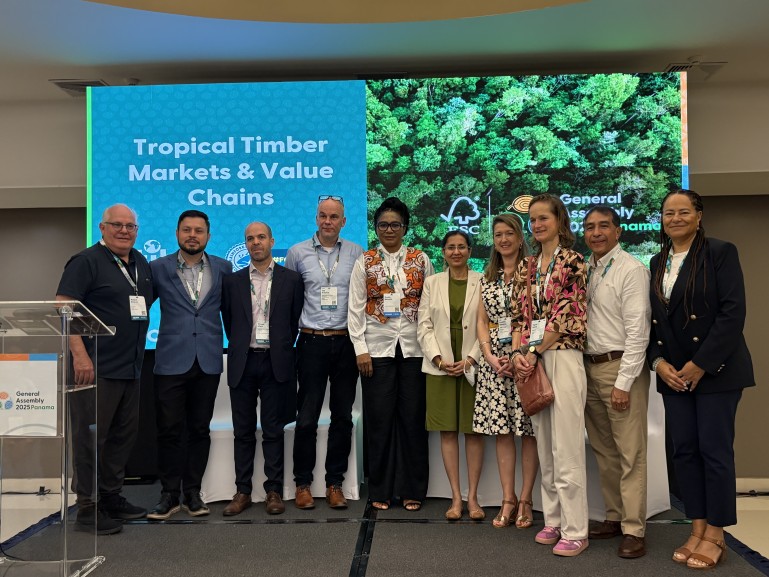

07.11.2025
From 27 to 31 October 2025, ATIBT took part in the FSC General Assembly in Panama City, one of the most significant global gatherings for sustainable forestry.

Represented by Caroline Duhesme, Director of Strategy and Innovation, and Nathalie Bouville, Marketing and Communications Lead, ATIBT actively contributed to the week’s discussions, panels, and side events. The association carried a clear message: sustainable tropical forestry is both a climate and development solution — and its voice must remain central in the FSC’s evolution.
Defending tropical interests through motions
ATIBT presented three motions at the General Assembly, each addressing a key aspect of FSC’s future:
While Motions 26 and 48 were rejected by the Economic Chamber, both received strong support from the Social and Environmental Chambers.
Moreover, motion 34 was passed, as were motions 45 (IFL) and 30 (integrity), which were also supported by ATIBT.
ATIBT members also took the floor in plenary sessions to support the motions and underline the need for better recognition of responsible tropical forestry within FSC.
Highlighting 30 years of certified tropical forestry
ATIBT co-organized two major side events with the Rainforest Alliance.
The first, “30 Years of Tropical Natural Forests and FSC Certification”, revisited three decades of experience in the Congo Basin and other tropical regions. Caroline Duhesme and José Román Carrera (Rainforest Alliance) reflected on the achievements and lessons of FSC certification, joined by speakers from Precious Woods, Imaflora, WWF, Utrecht University, and FSC Congo Basin. The second event, “Tropical Timber Markets & Value Chains”, brought together voices from across the sector — in particular Minister Rosalie Matondo (Republic of Congo) and FSC Director General Subhra Bhattacharjee — to discuss how responsible timber must become an asset, not a cost, in global markets.
Engaging in strategic dialogues
In addition to organizing sessions, the ATIBT delegation participated in several key events:
A stronger, united community
Beyond the debates, the FSC GA was also a moment to reconnect with members and partners — from CIB-Olam Agri, Precious Woods, Interholco, Rougier, WWF, Rainforest Alliance, Fedustria, AIMEX, and Preferred by Nature — and to reaffirm ATIBT’s role as the leading voice for tropical producers and the Congo Basin.
Looking ahead
ATIBT’s participation in the General Assembly strengthened its visibility and influence within the FSC ecosystem. The association remains committed to:
The week in Panama confirmed that sustainable tropical forestry is not only a conservation tool, but a pathway to equitable development and climate resilience. ATIBT will continue to ensure that this message resonates at the global level.
ATIBT's presence in Panama is supported by Tropical Timber Trade Facility (TTT), a project commissioned by the German government and implemented by GIZ.